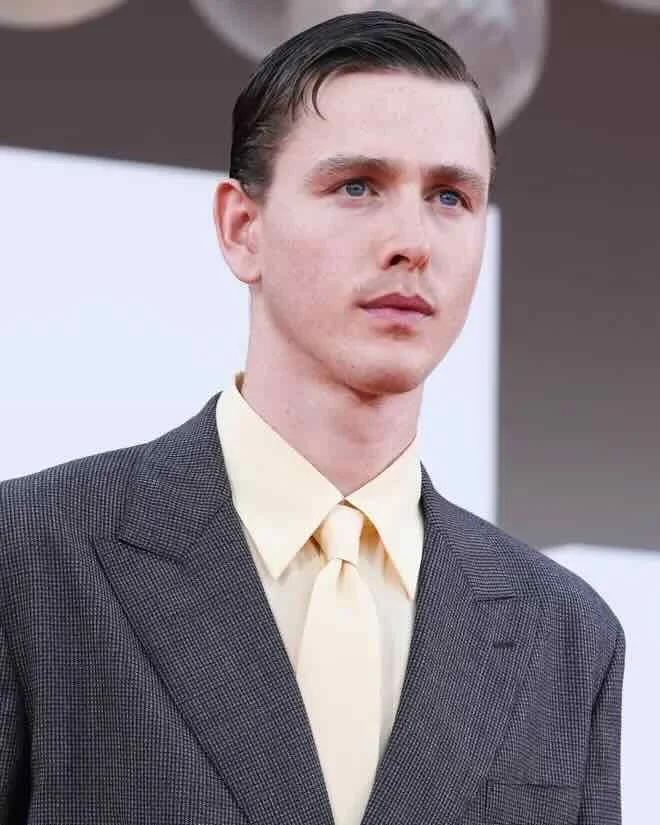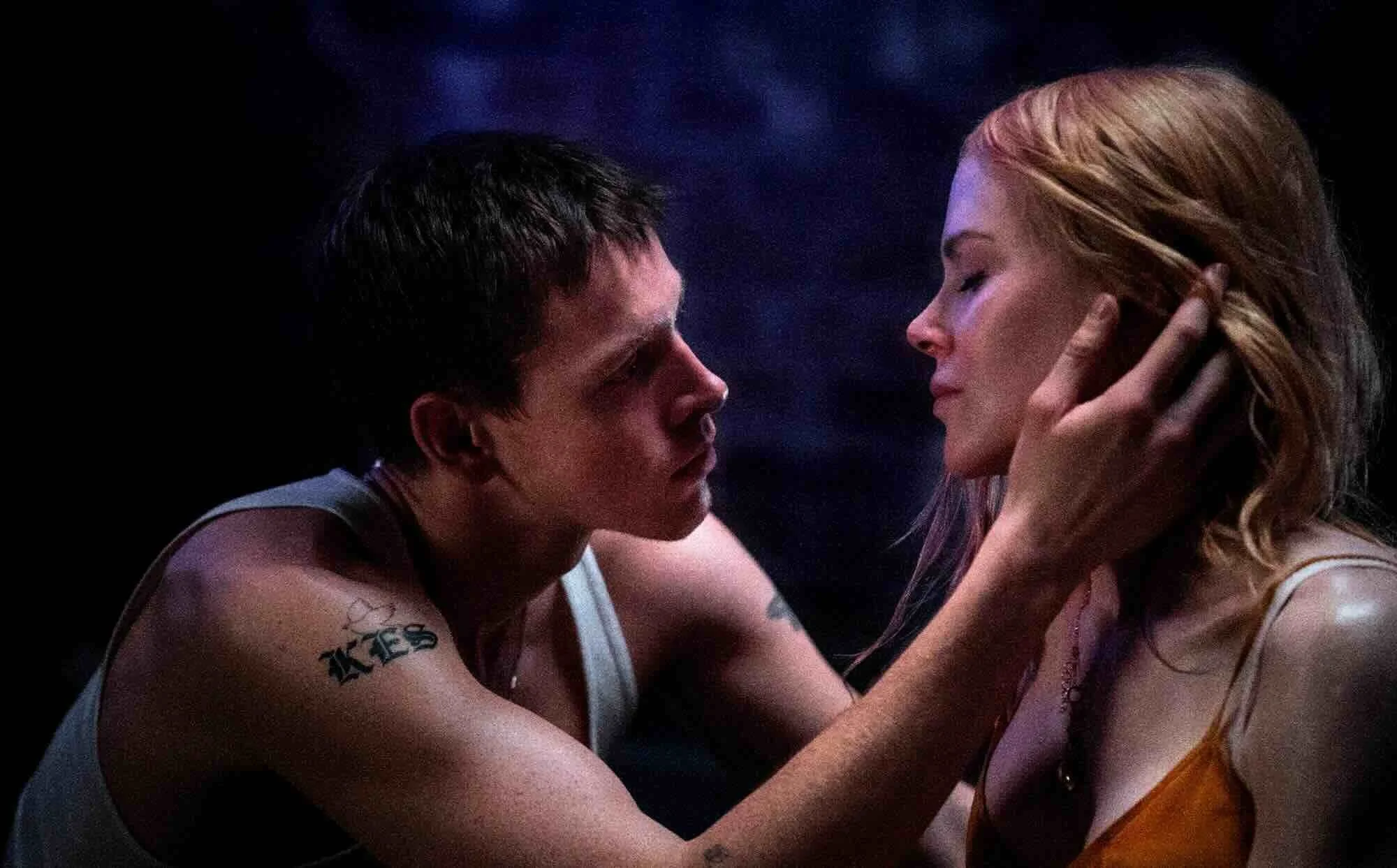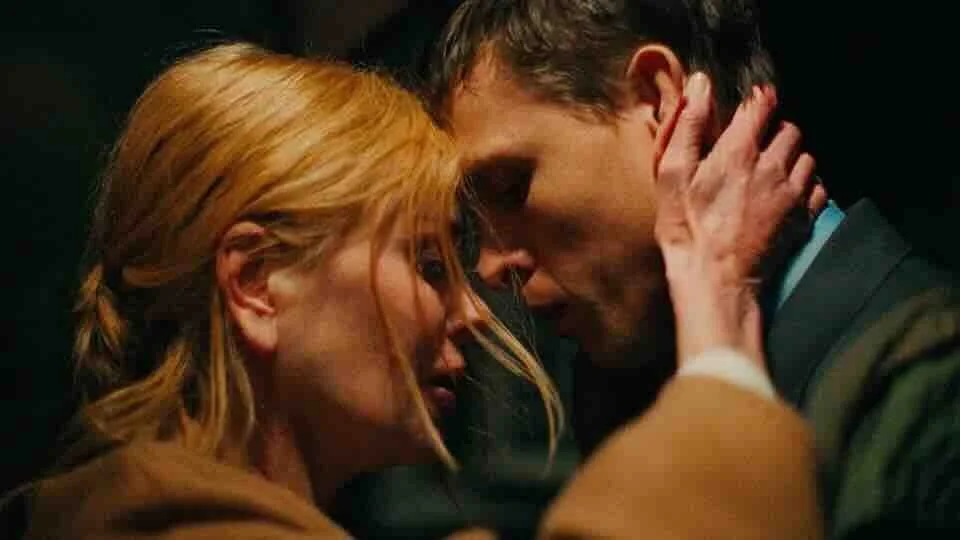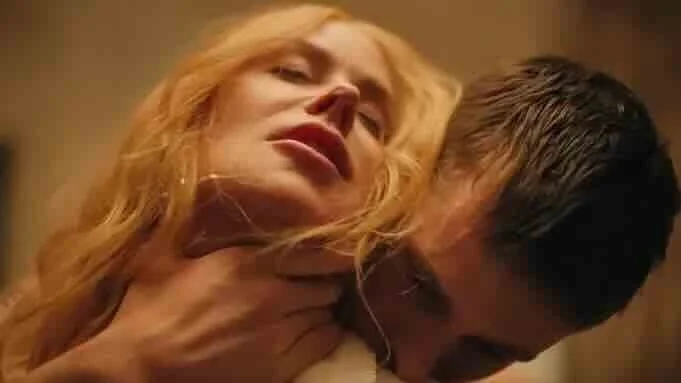Yes Harris Dickinson is (So, so) Hot in Reijn’s Babygirl, but Can’t Distract From the Evolution of Female Sexual Desire on Screen
For the longest time, Harris Dickinson felt like the best kept secret between a close friend and I. As big fan girls of his after watching movies like Beach Rats (dir. Eliza Hittman, 2017), Scrapper (dir. Charlotte Regan, 2023), and, of course, Triangle of Sadness (dir. Ruben Östlund, 2022), when news of his latest movie starring alongside icon Nicole Kidman under the title Babygirl dropped, believe we were so SEATED. (Warning, this piece will have HEAVY spoilers!)
Photo by Stefania D’Alessandro
Our commitment to any Harris Dickinson led movie meant that as soon as tickets dropped at my favourite cinema, I was ready front row to take it all in. Though I hadn’t made my mind up if the film would be silly or serious, I decided a regular dose of him calling lead actress Nicole Kidman “Babygirl” throughout the feature would surely get me through if the film tanked at my expectations. However, laying aside seeing a celebrity crush on screen and turning on my big girl brain combined with a debt-inducing three year bachelor’s in film, I would not just be watching for our East London born hunk. I had to take in each frame and dissect these images like every (annoying) film school kid would!
I could probably (and very willingly) talk about that one scene of Harris Dickinson dancing to George Michael’s “Father Figure” at length (critically of course...), however the serious conversation this film allows for is very clear whether you’re a fan of the flick or think it has flopped some expectations. From the moment my friends and I settled into our seats, before even a single image of the actual film had played, we were straight into the narrative themes as sounds of Nicole Kidman’s character Romy’s (tech company CEO) hot and heavy breathing accompanied the film’s production company credits. The sounds become presumptuous of a steamy, loving sex-scene about to take off; however, it ends just as soon as it starts as Romy’s husband Jacob (THE Antonio Banderas) finishes first leaving Romy unsatisfied. She steps out of the bedroom, slipping away to another room. What follows is a mix of uncomfortable, sad, and refreshing moments as our CEO goes to privately “take care of business”. Throughout, the audience can only hope that Jacob won’t walk into the room.
Photo by Niko Tavernise
In this scene, Romy’s messy hair is swept across her face, her breathing isn’t particularly sexy—just a real physical reaction to self-pleasuring. Laid on her belly, hand hidden, her laptop plays a genre of “Babygirl” porn, wherein girls call their male sex partners “Daddy”. The scene reminded me of Kristen Stewart’s Character Lou in Love Lies Bleeding (dir. Rose Glass, 2024) masturbating after work; both of these scenes don’t exist to be sexy or voyeuristic, they aren’t glamorous and don’t position these women to perform. Instead, they’re two recent examples of normalising female masturbation on screen, emphasising the ordinariness of female masturbation and pleasure as necessary. Throughout Babygirl this never changes, the film stays committed to reaching an authentic portrayal of Romy’s reactions to sex physically and mentally rather than giving a male gaze, porn-brain-rot (for lack of better words) exaggeration where loud moaning, calls, and cries might be anticipated. In the first intimately sexual scene between Romy and Samuel, there’s a moment where she says, “I feel like I need to pee, I don’t want to pee”, as she’s clearly discovering a new sensation of an orgasm she has not experienced before (mind you this all comes under a nineteen-year marriage with her husband!).
Photo by A24
Everything is relatively subtle. Of course there are sexual experiences and game play between the two affair-birds that are kinkier and thus more vulnerable, but even Harris Dickinson’s Samuel isn’t a stoic, sexually crazed guy. In bed he asks to be held, again a more realistic depiction of how male intimacy can look, and when initiating elements of power play, he can’t take himself too seriously and often laughs at the things he asks Romy to do.
Babygirl manifests ideas of sexual dynamics between men and women as an ongoing game that can have the most intense moments outside the bedroom. It’s in the prolonged foreplay between Romy and Samuel’s very clear power dynamic (such as sending her milk at the bar to watch her drink it amongst her peers while not even touching or speaking to her that night); it’s in the physical fighting between husband Jacob and intern Samuel (how the pause between Samuel and Jacob holding each other’s foreheads is a different kind of sexual interaction where my heart hopes a deleted scene of the three of them might and should exist); and it’s in Romy’s assistant covering up the affair (something that is usually done by men) in order to maintain Romy’s image as an honest woman CEO.
It's never truly clear why Romy is intrigued by her sexual desires. At times, she tortures herself trying to understand what is wrong with her to want this. There are passing hints when we learn about her not so normal childhood growing up in a cult, an environment that likely enacted control over her mind, body, and spirituality throughout her growing years. Another childlike reference is in a moment where Romy feels most comfortable hiding under the bed sheets for conversations with her husband Jacob, rather than expressing herself in a more open environment. But despite these moments, it’s never fully explored why her childhood haunts her to the extent of her Babygirl fantasies. It can be assumed that the power dynamics in her cult childhood could have contributed to her desire to maintain power dynamics in her work and home life, leaving her deprived of the care-taking figure she is expected to be for everyone else. Regardless, the fantasies she watches and envisions manifest in her feeling perverted, repeatedly speaking about herself as someone she says is “clearly not normal”. This end is never tied and so it does leave more questions than answers. We only get into the nitty gritty of her life as a mother, the need to fix her sex life with Jacob, balancing a secret new sex life with twenty-five-year-old Samuel, and balancing being a CEO role model all at the same time.
Photo by A24
After we watched the movie, a friend mentioned that visually a lot of the film is within the trailer (a point worth considering if you’re yet to watch it). Though this is true (however I guarantee that seeing Harris Dickinson dance on a blown out cinema screen is much better than an Instagram size trailer on your phone), what filters through the marketing of the film then is an urgency of exploring women’s needs, confidence, and communication as one interlinked experience. All three things implicate one another, without an ability to confidently communicate, our needs can’t always be met. It’s unclear whether Romy wants to feel as if, despite her achievements in her work life, it is still possible for someone to hold power over her, or if this desire is in fact to submit herself to someone else and be intentionally dominated rather than dominating. Although Romy is a business CEO with power over many other people, a position that allows her to have multiple homes and the ability to provide her daughters with whatever they want, the young insecure girl in her still takes charge at times. Within herself, there is a constant power play between her inner child and the image of being a CEO.
Photo by A24
In an early point in the film, Romy hides under the bedsheets, a mannerism that seemingly reflects her ability to feel safest when hidden. She tells her husband she wants to have sex while watching porn but, within the context of the film as a whole, this is a miscommunication from her own lack of confidence in admitting what she desires. She doesn’t necessarily want to have sex with her husband while watching porn, but she does want the dynamic plays of what she sees in porn in a safe, committed relationship. Through her not being able to communicate those desires to the person she trusts and admires most, she jeopardises her commitment to Jacob and goes to Samuel who has no obligation to her baggage. Once she acknowledges the need to be vulnerable as an intertwined objective to confidence, she is able to begin healing areas of her marriage she couldn’t before.
Should it have taken a twenty-five-year-old intern at her company to find confidence in her sexual desires and see herself as beautiful? In a real-world context, most definitely not. Ignoring the inappropriate workplace and age-gap relationship, there is a hopeful message, presenting female sexuality as something that is never too late to explore or take ownership of. The film could be seen as a fable to never take growing older as a write-off to new experiences. I mean, Miss Romy was coming home the next morning from raves, dancing in hotel rooms with a gorgeous man, and skinny dipping. It’s never too late, that inner young woman will remain, and it’s our job to never let ourselves feel that there’s a point in life where you have to lay her aside.





